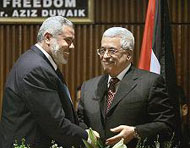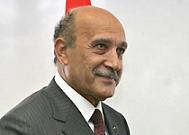The situation between Israel and Palestine currently resembles the structure of an exceedingly long and drawn out TV series which although moving at snails pace, still manages to keep the audience intrigued and transfixed on every episode. The last series of the saga ended with the events in Gaza in June, leaving everyone on tenterhooks. However, in a popular TV series, one is forced to wait in suspense for the next series and then has to bypass the initial episodes until progress is seen to materialize. The same is applicable with the Israel / Palestine saga. Everyone is still agonizingly waiting for something of substance to happen after many episodes of innuendos, hints and promises. The November Peace Summit is believed and hoped to be the turning point in the series.
The general climate is a lot more complex and serious than a script. Rhetoric is constantly and vehemently exchanged between the PLO sponsored government in the West Bank and the Hamas governing body in Gaza, the latter still reveling in their victory over Fatah forces in June. Deposed Hamas Prime Minister, Ismail Haniyeh has asked Abu Mazen [Abbas] to meet him without preconditions to discuss this “disagreement between brothers” but as a result of the brutal nature of Hamas’ takeover, Abu Mazen has refused to seek dialogue with Hamas until they return to the balance of power which existed in Gaza pre-June. The dichotomy is remarkable. Abu Mazen is flooded with contributions, aid and “gestures of goodwill” with the hope of consolidating his position in the West Bank whereas Gaza is an enclosed prison where border crossings are closed and where 1.5 million Palestinians are almost completely reliant on aid.
Hamas is adamant on hanging onto its only asset, Gaza, while Israel launches regular incursions into the area and threatens to sever ties with Abu Mazen if he speaks to Hamas. Therefore, a conundrum has been created which does not look likely to be remedied any time soon.
This is an especially enigmatic state of affairs as although they are politically estranged, both parties emphasize the importance of a union between the West Bank and Gaza in conjunction with the well-known moral from the sixth century BC Greek slave Aesop who stated that “united we stand, divided we fall”.
But Abu Mazen has no reason to talk to Hamas. If the present political and economic paralysis of Hamas continues, then the Islamic Resistance group will inevitably collapse. Even if Hamas is able to withstand the gradual political paralysis, they cannot escape the economic paralysis and vice versa.
Politically, Abu Mazen recently passed a new electoral law which abolished district voting (where Hamas dominated in the last elections) in favor of a more national voting process. The candidates must also accept and adhere to the PLO, the Palestinian Declaration of Independence (PDI) and the Basic Law. The problem that arises for Hamas through this new law is that the conditions are a complete antithesis of their political dogma. Hamas is not represented by the PLO and while they accept Basic Palestinian Law, they reject the introduction which recognizes the PDI as integral to the Palestinian system, namely accepting the two state solution, UN resolutions and embracing secularism.
In addition, Hamas’ actions, undoubtedly conjectured and embellished in places, portray an almost irredeemable portrait of Hamas in the eyes of the international community riddled with “evil” associations, conniving behavior, brutality, dishonesty and adopting a highly unreasonable political standpoint. Their bloody takeover of Gaza; Qassam rockets striking Israeli targets either in Sderot, Zikkim or Israeli border crossings; reported affiliation with Iran and even al-Qaeda; the refusal to release Gilad Shalit; the intention of implementing Shariah Law; the smuggling of arms; hijacking fuel supplies; and the beating of journalists as well as Fatah members staging peaceful protests are all working against Hamas' image.
Proof of the effect this negative political status is having on Hamas and the disintegration in their popularity can be detected in the recent polls collected by the Palestinian Center for Policy and Survey Research in early September. According to the survey, 73% of Palestinians oppose the takeover of Gaza by Hamas; over half believe Hamas should be out of office; 46% support Abu Mazen’s prerequisites for dialogue with Hamas; 58% support the new electoral law decree and most tellingly, Hamas’ popularity has dropped from 37% to 31% since March.
Even if Hamas could counter this dreadful political reputation, there is the potential economic crisis which could engulf them and plunge them into further disaster. The fact that Gaza is nearly completely dependent on aid, with Israel being the main supplier of water and electricity to the area as well as the fact that all entry and exit to and from Gaza is controlled by Israeli border crossings, places Hamas in a very tenuous and would-be catastrophic position. At any point Israel can cut off all supplies to Gaza and wait for the discontented people to rise up in stiff opposition to the conditions. Although a risky ploy, as this could bring the people closer to Hamas in solidarity against a common evil as well as attract a lot of international publicity, it is still a viable option at Israel’s disposal.
In addition, Prime Minister Salam Fayyad could take the advice of former Israeli official, Rani Loewenstein and neutralize the accounts of social welfare organizations such as al-Salah and the Islamic charity which Hamas rely on heavily for financial support. On the other side, the biggest Israeli bank, Hapoalim, has just stated that it is ceasing all dealings with Gaza.
The third option of dealing with Hamas and their resistance is a full-scale operation into Gaza, a motion supported by Defense Minister Ehud Barak. However, simple risk analysis of the situation would deduce that this is purely counterproductive. Hamas is, in some respects still somewhat of an unknown entity but more importantly, military action is just not required and cannot be solely justified as a reprisal for ineffective, primitive Qassam attacks. Israel conducts regular incursions into Gaza but at this stage, why risk a repeat of the Second Lebanese War last year?
From the information above, one would presume that Hamas is a controllable enemy which is ultimately becoming crippled politically and soon to be cast into obscurity. Those who think this must not underestimate how pivotal November is to guarantee the balance of power in the Middle East does not shift. November may have been diminished in status by the US from a “conference” to a “meeting” but echoes from prominent Arab leaders must be heard. Whatever it is to be called is absolutely crucial in preventing a serious backlash in Palestine.
All the meetings between Olmert and Abu Mazen in the last few months have mainly arrived at the same conclusion. Palestinians want to discuss the “core issues” of borders, Jerusalem, settlements and refugees whereas Israel refuses to decide over “core issues” without an “agreement of principles”, the construction of a blueprint by which these issues can eventually be put into place.
As a result, there has been a lot of skepticism accumulating over the value and the relevance of November, so much so that the Foreign Minister Prince Saud al-Faisal has stressed that Saudi Arabia, the paternal Arab state, may not see the value of attending. However, with Syria now looking to be involved, there is hope that more will be achieved as their attendance will offer a voice for Hamas as well as give an opportunity to discuss their grievances with Israel over the Golan Heights.
Secretary General of the Arab League, Amro Moussa; King Abdullah of Jordan, President Mubarak of Egypt and of course, President Abbas have all voiced their concerns about a failed November meeting. Even US Secretary of State Condoleezza Rice, a frequent visitor to Olmert and Abu Mazen and a strong supporter of developing their political relationship, has declared her worries about what will happen in Palestine if November fails.
If Abu Mazen returns from the US with no plan that highlights movements towards achieving solutions to the “core issues” then this could spark a complete no confidence vote for the president. Further still, if the Palestinian demands are not even contemplated then the people may become frustrated, seeing no point in this new relationship with Israel as there will be no visible benefits springing from almost six months of deliberations.
One of the main obstacles to progress for the Palestinians is the popularity of Ehud Olmert. In Israel he is very much seen as an “appointed” prime minister, not an “elected” one. Olmert has just about survived recent no confidence votes in the Knesset, calls for resignation from his own Foreign Minister Tzipi Livni and is still criticized for his handling of the Second Lebanese War currently under evaluation from the Winograd report. What is more shocking is that a recent poll reported that if elections were tomorrow, Olmert would only receive 8% of the vote, significantly behind Defense Minister and Labor’s Ehud Barak and Likud’s Benjamin Netanyahu. Olmert’s lack of bargaining power was evident when he promised Abu Mazen that roadblocks would be reduced in the West Bank. Barak claimed that this move was impractical, a danger to Israel and incongruous with Israeli interests. The reduction was subsequently abandoned.
Rightly then, only 26% of Palestinians believe November will yield positive results. The priority has to be to avoid the ramifications of what happened at Camp David in 2000 where disagreement between parties and limited action caused the outbreak of the Second Intifada.
Ma’an News Agency a couple of weeks ago reported that they had stumbled across a document in Hebrew which laid out eight points of discussion for Abu Mazen and Olmert to contend. While the document deals with potential solutions to “core issues”, it must be mentioned that both Israeli spokesperson Miri Eisin and Palestinian chief negotiator, Saeb Erekat have both denied that a “core issue” discussion has taken place. According to various representatives, Abu Mazen and Olmert are concentrating their time on agreeing to a framework with which to present the other parties in November.
For the sake of the Palestinians and Abu Mazen’s popularity, one hopes that the eight point document does exist in some form. The consequences of a failed November for Abu Mazen are difficult to predict but at the same time could be potentially disastrous. It must be remembered that in 2006 Hamas secured 44% of the vote in Palestine and while that number may have decreased, they still possess a significant amount of support. If one then adds a failed November, who knows how Palestinians may react. One of the reasons Fatah did so badly in 2006 was because many of their supporters were exhausted with them and voted for Hamas. After a brief honeymoon period, the same could happen again.
Not just Olmert, but Israel should realize that they must include “core issues” on the agenda. As soon as November is over, changes must immediately be visible and tangible with a gradual timetable for the future. Abu Mazen must be given something to prohibit pandemonium from erupting in Palestine causing more delays in the peace process and more humanitarian destruction.
A successful November would hammer yet another nail into the Hamas coffin and even compel them to give up Gaza, reach a common ground and find a place to co-exist with Fatah. One just hopes that if this happens, Fatah would comply. After all, if Israel is adamant that they want to pursue peace then this is the best avenue and opportunity open to them since Oslo. If they disregard this chance and allow it to pass by, like Oslo, they may extend the struggle for many more years, which begs the question whether Israel actually wants peace at all?









